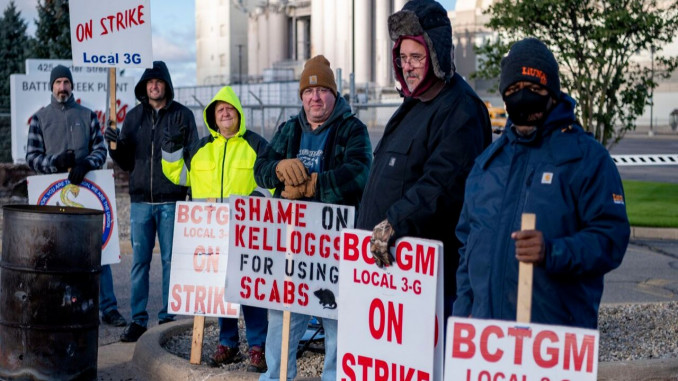
On December, 27th, after two and a half months on strike, workers at Kellogg’s voted to ratify a five-year contract and return to work. The strike involved approximately 1,400 workers of the Bakery, Confectionery, Tobacco Workers and Grain Millers International Union (BCTGM) in Battle Creek, Michigan; Omaha, Nebraska; Lancaster, Pennsylvania; and Memphis, Tennessee. At this time, it’s unclear what percentages of the members voted for and against this contract proposal.
A major source of the fight against Kellogg’s was the two-tier contract that paid workers who had been hired during 2015 or after at a lower pay-scale than previously-hired workers for the exact same jobs. Workers correctly saw the massive threat that accepting a two-tier system plays in undermining unity between people with different levels of seniority. While the current contract is touted by some as a blow against the two-tier system, the reality is more complicated. With the current contract, the promise is that the workers who have been hired more recently could be put on a “pathway” to be compensated at the same pay-scale as the higher seniority workers. Management estimates that it would take around six years to reach the first tier, a year longer than the duration of the contract.
The workers also won some modest wage increases, but not significant enough given the record inflation that has been felt across U.S. society. The contract also includes a prohibition of any plant closings within the next five years – something that Kellogg’s had threatened to do by moving production to Mexico.
This strike was hard fought and contentious from the start, but the small cohort of strikers won support from many other working people fed up with the same problems. Last month, after the strikers voted down two previous tentative agreements, Kellogg’s infamously proposed to bring in replacement workers to break the strike. In response, various online communities of strike supporters flooded Kellogg’s with phony job applications to thwart the process, with some level of success.
In this economy, where corporate profit comes before all else and workers’ needs come way behind, we can be sure that struggles like this will continue. While it was far from a complete victory, the workers at Kellogg’s can hold their heads up high for taking a stand. Despite the company’s hard line, despite the small size of the union locals on strike, and despite everything else arrayed against the workers, they put up a resolute fight. They are part of a growing movement of working people, from John Deere manufacturing workers in the Midwest to carpenters in the Northwest, stagehands in the film industry to engineers at Kaiser hospitals, who are saying “no” to the constant erosion of our lives.




